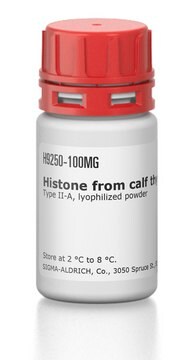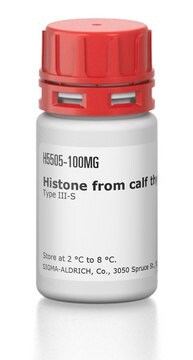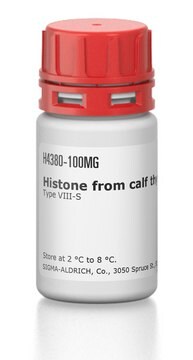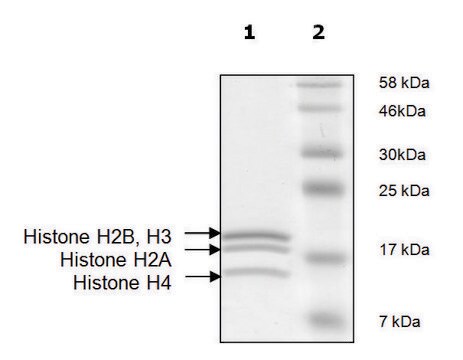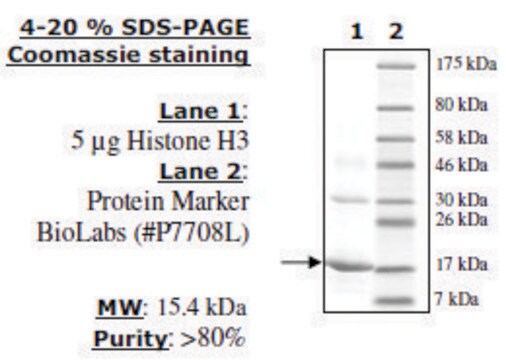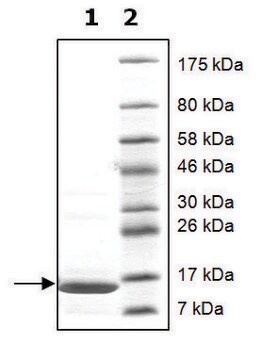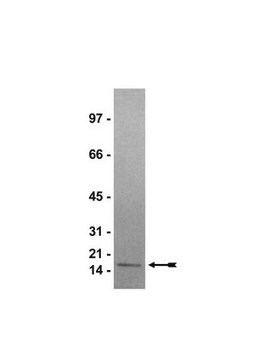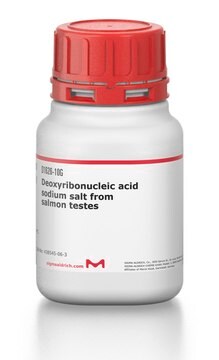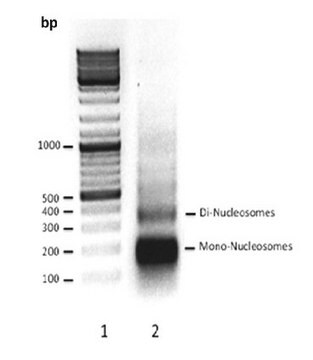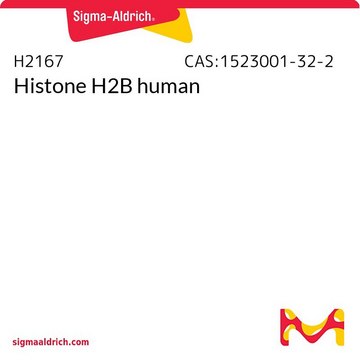10223565001
Roche
Histone
from calf thymus
Synonyme(s) :
histone
Se connecterpour consulter vos tarifs contractuels et ceux de votre entreprise/organisme
About This Item
Code UNSPSC :
12352204
Produits recommandés
Niveau de qualité
Forme
lyophilized
Conditionnement
pkg of 10 mg
Fabricant/nom de marque
Roche
Conditions d'expédition
wet ice
Température de stockage
2-8°C
Catégories apparentées
Description générale
Mixture of histones H1, H2A, H2B, H3, and H4, isolated from calf thymus.
Histones are a group of DNA-binding proteins that are characterized by relatively high levels of lysine and arginine. Five different fractions of histones have been isolated and characterized. These are named as H1, H2A, H2B, H3 and H4. The H1 fraction is lysine-rich, while the H2A and H2B are slightly lysine-rich, The H3 and H4 fractions are arginine-rich. The molecular weights of histones are approximately 11 to 21 kDa depending on the fraction.
Histones are a group of DNA-binding proteins that are characterized by relatively high levels of lysine and arginine. Five different fractions of histones have been isolated and characterized. These are named as H1, H2A, H2B, H3 and H4. The H1 fraction is lysine-rich, while the H2A and H2B are slightly lysine-rich, The H3 and H4 fractions are arginine-rich. The molecular weights of histones are approximately 11 to 21 kDa depending on the fraction.
Application
Histone from calf thymus has been used:
- in in vitro kinase assay to check the phosphorylation of histones by protein kinase A.
- to check the in vitro methyltransferase activity of protein argininemethyltransferases from Oryza sativa (OsPRMTs).
- in anti-histone ELISA.
Actions biochimiques/physiologiques
Histones have an important role in the organization and modification of chromatin. The nucleosome is the basic unit of the chromatin. It is made up of two molecules each of histones H2A, H2B, H3 and H4, wrapped with approximately 146bp of DNA. Histone H1 binds to the nucleosomes at the DNA entry and exit points and stabilizes them.
Forme physique
Lyophilizate (natural mixture of histones H1, H2A, H2B, H3, and H4).
Notes préparatoires
Working concentration: 1 to 5 mg/ml.
Working solution: Recommended solvent is double-distilled water.
Storage conditions (working solution): Aqueous solution is stable at -15 to -25 °C for several months.
Avoid repeated freezing and thawing!
Working solution: Recommended solvent is double-distilled water.
Storage conditions (working solution): Aqueous solution is stable at -15 to -25 °C for several months.
Avoid repeated freezing and thawing!
Autres remarques
For life science research only. Not for use in diagnostic procedures.
Code de la classe de stockage
11 - Combustible Solids
Classe de danger pour l'eau (WGK)
WGK 1
Point d'éclair (°F)
Not applicable
Point d'éclair (°C)
Not applicable
Faites votre choix parmi les versions les plus récentes :
Déjà en possession de ce produit ?
Retrouvez la documentation relative aux produits que vous avez récemment achetés dans la Bibliothèque de documents.
Les clients ont également consulté
H1 histone and the condensation of chromatin and DNA.
R D Cole et al.
Cold Spring Harbor symposia on quantitative biology, 42 Pt 1, 253-263 (1978-01-01)
Core histones H2B and H4 are mobilized during infection with herpes simplex virus 1.
Conn KL, et.al
Journal of Virology, 85(24), 13234-13252 (2011)
Ona Bloom et al.
Proceedings of the National Academy of Sciences of the United States of America, 108(25), 10255-10259 (2011-06-08)
Systemic lupus erythematosus (SLE) is a chronic autoimmune disease characterized by the presence of pathogenic autoantibodies, many of which are directed against nuclear antigens, in particular double-stranded (ds) DNA. Both clinical studies and animal models have shown that anti-dsDNA antibodies
Abinaya Rajendran et al.
Biochemistry, 59(2), 183-196 (2019-09-04)
The metabolic serine hydrolase family is, arguably, one of the largest functional enzyme classes in mammals, including humans, comprising 1-2% of the total proteome. This enzyme family uses a conserved nucleophilic serine residue in the active site to perform diverse
The histone variant H3.3 marks active chromatin by replication-independent nucleosome assembly.
Ahmad K and Henikoff S
Molecular Cell, 9(6) (2002)
Notre équipe de scientifiques dispose d'une expérience dans tous les secteurs de la recherche, notamment en sciences de la vie, science des matériaux, synthèse chimique, chromatographie, analyse et dans de nombreux autres domaines..
Contacter notre Service technique